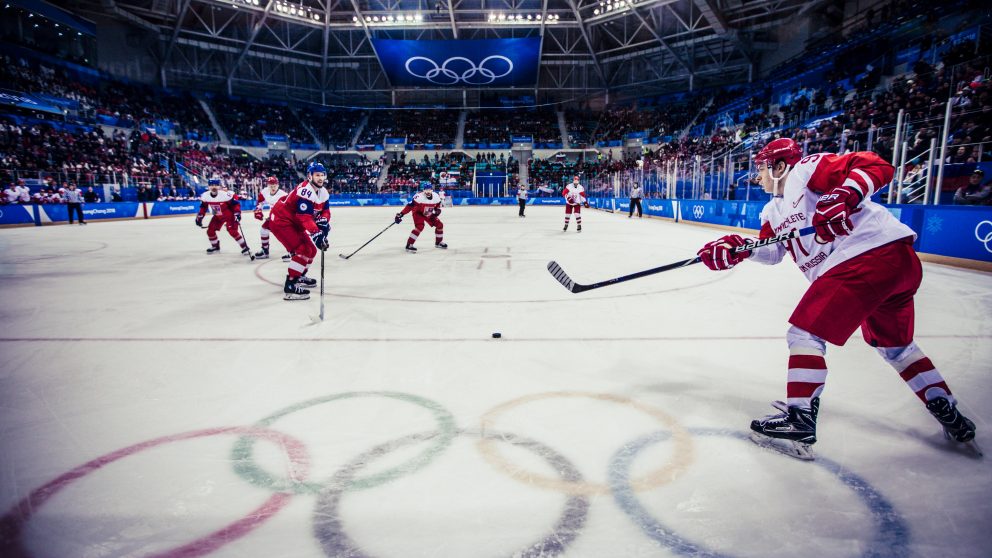


IOC’s Chief Information Technology Officer Ilario Corna talks about his ambitions for Beijing 2022. Photo credit: IOC
A blitz of digital content, performance stats and even holograms are dazzling sports fans tuning into the Olympic Winter Games Beijing 2022, as organizers seek to reach and entertain spectators kept at home by travel restrictions.
To curb the spread of the coronavirus, spectators can enter competition venues by invitation only, so the International Olympic Committee (IOC) is bolstering remote fan engagement by delivering an array of content via the cloud.
The man overseeing the technology behind the world’s biggest sports show is Ilario Corna, the IOC’s Chief Information Technology Officer, in concert with Olympic partners such as Alibaba Group.
“Beijing 2022 is set to be the most immersive Olympic Winter Games yet,” said Corna, the man responsible for building Discovery Inc.’s streaming service Discovery+ before joining the IOC in 2020.
A touch of daring and a series of calculated risks are needed to keep the Olympic Games abreast of the rapid-fire digital innovations in sports coverage.
The industry has embraced artificial intelligence to collect and analyze athletes’ performance, drones to capture images from on high, and virtual reality to enrich content, with the stream of data generated stored and delivered via the cloud.
“At Beijing 2022, you’ll catch the first glimpse of what’s in store,” said Corna in an interview with Alizila.
The Swiss-Italian joined the IOC mid-pandemic, and his crews have had to navigate the spread of the coronavirus first at Tokyo 2020 and now at Beijing 2022.
But for Corna, technical excellence at Beijing 2022 is more than just overcoming the logistical challenges of delivering another Olympic Games during a pandemic, it is the start of a more sustainable IT infrastructure built solely on the cloud.
“We’re moving away from building the technology to building platforms that can be improved for the next Olympic Games using cloud computing,” said Corna, speaking from Beijing.
The following interview transcript has been edited for brevity and clarity
Q. Is Beijing 2022 a digitally richer and more interactive Olympic Games than Tokyo 2020?
Beijing 2022 is set to be the most immersive Olympic Winter Games yet. We are stepping up our game and jumping to the next level of data analytics, delivering unprecedented insights to viewers worldwide.
For the first time, OBS will capture, produce and distribute footage of the Olympic Winter Games in live 8K Virtual Reality (VR).
When I was a child, technology breakthroughs happened at the Olympic Games. Technology is moving fast, and I’m committed to keeping pace.
At Beijing 2022, you’ll catch the first glimpse of what’s in store.
Q. How did the idea to use holograms come about?
Alibaba CEO Daniel Zhang’s virtual meeting with President Thomas Bach showcased how cloud can support virtual/augmented reality. It was truly an eye-opening moment.
To be clear, it was a late addition to the program. Myself and Selina Yuan, General Manager of International Business at Alibaba Cloud Intelligence, discussed how we could bring people inside the closed-loop [the bubble system separating the Winter Games from the rest of the city] and we had just one month to decide on a plan.
Because the idea came very late in the game we couldn’t go as big as we wanted, but this technology has such great potential we are discussing how we can expand the use of the cloud to support real-time, true-to-life projection going forward.
Q. Where else can the Olympic Games interplay with the metaverse?
The Olympic Virtual Series is where the metaverse and the Movement really come together. Such investment in virtual sports means we can engage a younger age group.
For Beijing 2022, we have developed a mobile game in which fans can compete with up to 15 players worldwide in real-time, arcade-style, Olympic Winter Games events and win Olympic NFT digital pins.
Q. Is there more extensive use of cloud services at Beijing 2022 versus Tokyo 2020?
We’re able to accelerate our adoption of cloud computing given the ubiquity of 5G in China. The cloud offers lower latency and efficiency; as a result, we’re able to transmit more video.
Our websites are all on Alibaba Cloud, helping us reach a massive digital audience. Over 175 million unique users visited our Olympics web and app during Tokyo 2020.
Q. How will you enhance digital storytelling at Beijing 2022?
We will continue to make improvements for rights-holding broadcasters to help them tell the Olympic story. Thanks to the cloud-based infrastructure, content can now be distributed faster and more accurately than ever before. Virtualization opens new opportunities that could lay the groundwork for producing the Olympic Games in a whole new way in the near future.
We are also enhancing the digital experience on second screens, for people not sitting in front of a TV but still wanting to follow the Olympics. Right now, we are taking baby steps in this direction, but for Paris and onwards, this is exactly where we’re going. We’ve been focused very much on the televised experience and now we need to think more about the digital experience on second screens.
There will also be larger screens in the stadia to improve virtual fan engagement and bring athletes closer to their families.
Q. How is technology making the Olympic Games more sustainable?
This is an important objective for us. Naturally, cloud computing is very scalable when used correctly, and that’s critical for such an extremely large event as the Olympic Games. Remember, three-quarters of the world’s population interacted with us during Tokyo 2020.
The IOC used to rebuild the IT infrastructure for every Olympics, installing servers from scratch. We’re moving away from building the technology to building platforms that can be improved for the next editions using cloud computing.
Of course, we have to invest the first and second time we use this approach, but it will start paying off by the fourth or fifth host city.
Q. How can technology make the Olympic Games more inclusive?
Broadcast coverage and digital platforms help make every edition of the Olympic Games more inclusive as wider audiences can access athletes’ stories and sports. Beijing 2022 will be broadcast globally, with more broadcast hours than ever for an Olympic Winter Games and a record amount of coverage on digital platforms.
New technologies are also improving sport facilities and training approaches. My dream is to make this technology available to athletes from less affluent countries and level the playing field for them. To do this we can work with Alibaba Cloud, which is accessible anywhere.
Q. How do you balance innovation and the need for robustness?
I take a very measured and calculated approach to risk because, if I make a mistake, three-quarters of the world’s population is watching. That said, in the coming years we will take more risks because there is a lot of innovation happening and we need to pick up our pace.
When I worked at Discovery Inc.’s Eurosport, I was responsible for building the infrastructure behind the streaming service Discovery+. When I explained what I wanted to build, they told me I was crazy. However, we were able to launch in country after country quickly.
I’m a risk-taker. There’s a level of risk to creating a streaming service for the Olympic Games, but we need to start moving in that direction.
Q. How can technology contribute towards making the Olympic Games more sustainable for host cities?
In Tokyo, the footprint of the International Broadcast Centre, the media hub for televising Tokyo 2020, shrank by about 30% compared with Rio 2016. There were about 25% fewer broadcasters present, while hours of footage created rose by about 30%.
It will be interesting to see how we can work with a partner like Alibaba Cloud on leaving behind a lasting legacy in terms of better technology when Dakar hosts the Youth Olympic Games in 2026.
Q. Has the pandemic made the role of CIO more difficult and more high profile?
The pandemic has taken management teams by surprise, waking them up to the value of digital transformation. The chief technology or information officer now generally reports directly to the CEO.
So, CTOs and CIOs have to translate technology no one understands into concepts that can help make business decisions. They have to be transparent about the value that technology can deliver.
Technology for technology’s sake serves no business.







